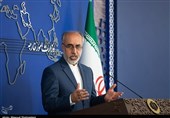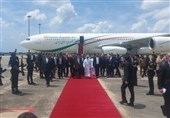UN Rapporteur Calls for End to Sanctions against Iran
TEHRAN (Tasnim) – A special United Nations rapporteur called for the removal of unilateral sanctions on Iran in a report that details the effects of decades of embargos on the country.
In the report, published on Monday, Alena Douhan, whose role is focused on the negative result of the sanctions, said that they had affected nearly every aspect of life in the country, and called for them to be lifted. Al Jazeera reported.
According to Douhan, even as medicines and food are supposed to be exempt from sanctions, general licenses issued by the US Office of Foreign Assets Control (OFAC) aimed at ensuring exemptions “appeared to be ineffective and nearly non-existent”.
She said delivery of medicines and medical equipment to Iran was “severely undermined” by the effects of sanctions on finance, trade, shipping, insurance and over-compliance on the part of foreign businesses and suppliers.
“These constitute serious impediments to the enjoyment of the right to the highest attainable standard of health by all Iranians.”
The overwhelming majority of the many layers of sanctions have been imposed by the United States, but others including the European Union, Australia and Canada also have a history of blacklisting Iran and are mentioned in the report.
Since 2018, when former US president Donald Trump unilaterally reneged on Iran’s UN-backed 2015 nuclear deal with world powers, Washington has enforced a “maximum pressure” campaign of harsh sanctions that have been expanded by President Joe Biden, even as efforts continue to restore the accord.
Effect of sanctions
While Iran produces about 95 percent of its medicines and vaccines locally to mitigate the consequences of sanctions, it has had difficulty procuring raw materials and ingredients, the report said.
US sanctions have also led to the deaths of patients with rare diseases, as they have blocked the supply of life-saving medicines and medical equipment required to treat certain types of cancer, thalassemia, haemophilia, leukaemia, multiple sclerosis and epidermolysis bullosa (EB).
Citing data by the Iranian Chamber of Commerce, the report points out that US sanctions since 2018 jeopardized the country’s food security by disrupting the supply of at least 10 million tons of agricultural imports, constituting a “clear violation of the right to food in terms of access and adequacy”.
The report also focused on the effect of sanctions on the ability of Iranians to buy food.
Rampant inflation – currently at about 40 percent – and currency devaluation have meant that food prices are contributing to huge increases in household costs.
Significantly, the report points out that Iran is home to more than five million immigrants and refugees, many of them Afghans in dire need of humanitarian assistance.
It argues that the sanctions have “adversely impacted the government’s capacity to protect and humanitarian actors’ ability to implement projects, including the provision of basic goods, and construction of schools and health centers”.






